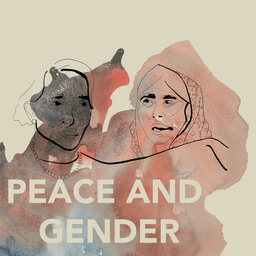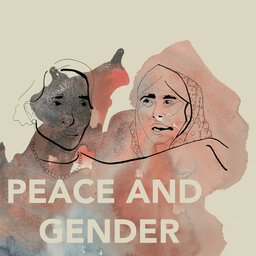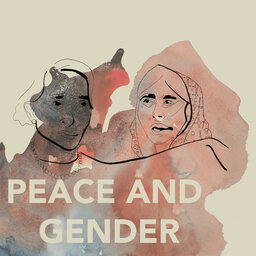Peace and Gender is a new podcast about the people behind the research on gender, peace, and security. In this episode, AndreaThiis-Evensen meets up with Professor Karin Aggestam, a Swedish researcher who specialises in the underrepresentation of women and LGBT people in diplomacy.
This is the first in a series – a collaboration betwen Mojo News (Monash Journalism) and Monash Gender, Peace and Security, a group of policy and community engaged scholars whose research is focused in this area. The aim is to use the research to inform people, educators and policy-makers on the gendered politics of armed conflict and the search for peace.
TRANSCRIPT
Andrea: Hey, my name is Andrea Thiis-Evensen. Welcome to Peace and Gender, the podcast about the people behind the research on gender, peace and security. In this podcast series I'm going to meet up with new professors and academics coming from all around the world who specialise in gender, peace and security.
In this podcast I'm trying to not only get a better understanding of the studies, but also the people behind the papers and research. Who are they? Why do they research these issues? Most importantly, what are the issues regarding gender, peace and security that we actually need to talk about today?
In this episode, you will meet Professor Karin Aggestam. Karin is a professor in political science at Lund University in Sweden. In this episode, Karin's going to talk about the underrepresentation of women in diplomacy and why this is a problem. Karin also talks about a topic that I myself had never considered which is how difficult it can be for LGBT people in diplomacy, but more on that later.
To begin with, when did Karin start studying gender, peace and conflict?
Karin: My area of interest in - generally like peace and conflict - has been all my career, including also as an under graduate and a post graduate. Peace and conflict has been an area which I find extremely interesting because it's also inter-disciplinary, and it provides lots of opportunity to lots of interesting stuff in academia. I've never left that area. Then I've worked also for a very long time on the Middle East, and particularly on the Israeli Palestinian conflict.
When it comes to gender it's something that I already - as a PhD candidate, together with some other of my colleagues, we got together in the 1990s - in the end of the 1990s - and had a big conference on feminist perspective in international relations, which at the time was considered very new area. We had a great conference and a great launch at Lund University. That also goes a long way back in time.
Andrea: Like many other professors and people, Karin has a life project within her academic world. A specific academic curiosity as she calls it, or an issue that she wants to explore.
Karin: My sort of curiosity, academic curiosity, has always been driven by a search for how we can sort of enhance a peaceful world order. That's actually one reason why I did get - I was promoted to the Pufendorf Chair Professor because I have been working consistently in all my work, even though it has been very diverse, and diverse empirical domains. Also theoretically it has always had us and our overarching quest of how we can advance a more peaceful world order.
Andrea: One of Karin's most recent books is Gendering Diplomacy and International Negotiation.
Karin: There is so few studies in the field of diplomacy. I put together, a couple of years ago, two panels at one of the big international conferences for international studies on diplomacy, together with Ann Towns who's a professor at Gothenburg University.
We had these two panels and very exciting discussions and interesting papers. From there we decided that we wanted to pull together these papers into book because - to make one step further to create a more robust theoretical field and also for empirical studies, so having a first take on that.
Andrea: Karin's book addresses the critical question of where are the women in contemporary diplomacy and international negotiation.
Karin: Well my key interest in diplomacy is related to peace and conflict and that's why I have studied. I spent lots of time on peace negotiations which are so critically important in the transition between war and peace. This is, most of the time, conducted by men only, and I find this very troubling.
Andrea: Can you tell me a bit about the issue about the lack of women and the overrepresentation of men in diplomacy?
Karin: Well if you have an institution of diplomacy where 85 per cent of them are men, there is an issue to be dealt with and needs to be addressed. That's a starting point to problematize this very male institution and why that is the case. You can do that through various approaches and that's what we try to show in the book.
Obviously there have been a number of bans in place excluding formerly women from participating in diplomacy. As we point out this is a relatively new phenomenon in the sense that they were introduced as part of the professionalization of the Ministry of Foreign Affairs in the nineteenth century, and lifted first at the beginning of the twentieth century. That was still in place when it came to marriage ban which was first lifted in the 60s and the 70s. It's actually only in the last few decades that women have been able fully to participate and make careers as diplomats.
Andrea: The history of women in diplomacy is more complex than one might think.
Karin: What is interesting when - to take a more historical perspective that's why we argue in the book also that we need to analyse and study microhistory of specific periods of time because we can see that exclusion and inclusion of women fluctuates over time. What we show, by looking and digging deeper into diplomatic history, is that actually women during the sixteenth, seventeenth century, eighteenth century, did take a very active part especially on the cases that we have on European history where women could make use of the fact that the boundaries between formal and informal institutions were much more fluid. That created lots of opportunities for women to take part.
Of course we are then talking about elite women, women married to an ambassador, connected to the Royal Court. These were women with very interesting stories, highly skilled, who played critical role both in negotiations, facilitating communication, building trust and so on. This is sort of adding new critical insights, I would say, to history.
Also there were different concepts like Cynthia Enloe has discussed the role of the diplomatic wife which is more recent. If we go back in time, another very interesting arena or forum where diplomats often made the critical decision was in the saloon. In the saloon these were hosted and often orchestrated by women who then again were - you could say - playing the role as mediators, negotiators, communicators; the key critical functions of diplomacy.
Andrea: As I mentioned earlier, Karin does not only focus on women being underrepresented in contemporary diplomacy.
Karin: First of all, when it comes to not only women but also the LGBT people, first of all we also need to recognise - I'm probing again the barriers that are at play here, and how these people may find it difficult to operate in a very traditional masculine institution as diplomacy. The question is to what extent diplomacy as an institution constrain and enable actions for women, for LGBT people, transgender. It's something we need to probe, and to analyse, and to unpack in the quest of transforming diplomacy in the sense of becoming more inclusive and open.
What is interesting is if we take this historical perspective and look back in time, it's very interesting to find cases of transgender who act as diplomats. We have a case in the seventeenth century of a man, born as a man but - and becoming a diplomat - but always dressed as a women, and identifying as a women, until he died. There are many many more cases that we can look for and study, learn and understand also how gender categories are fluid at times in specific historical periods of time, and others where it's much more of policing and controlling boundaries.
Andrea: As Karin writes in her book, women now make up just 15 per cent of the top diplomatic positions worldwide. While Nordic countries stand out with an average of 35 per cent female ambassadors, the numbers are still pretty low. Karin argues that the more gender equal a country is, the more likely they are to appoint female ambassadors. How does it make a difference to have more women in diplomacy?
Karin: We need much more studies on the effects of the increasing number of women, that we now see women participating in diplomacy. What are the effects? To what extent do women have to adjust to the traditional script of diplomacy? Are they able to bring forth new issues? Are they able to promote specific women issues? All these questions needs to be discussed more thoroughly. There's not a clear-cut answer to that question, and it's too naïve and too simplistic by stating, as some policymakers at times are doing, saying that adding more women by itself creates gender equality because that does not always correlate.
Of course there's a number of different school of thoughts here. There are some who would say that if you reach a critical mass, things change. There are different schools of thought on this. We have seen this - for instance very interesting by other gender scholars on domestic politics and national institutions, but very few studies when it comes to the field of diplomacy. That's why we hope to see many many more studies unpacking this assumption that is still there in the contemporary international policy [unclear].
First of all when it comes to not only women but also the LBGT people, first of all we also need to recognise and probing again the barriers that are at play here, and how these people may find it difficult to operate in a very traditional masculine institution as diplomacy. The question is to what extent diplomacy as an institution constrain and enable actions for women, for LGBT people, transgender. It's something we need to probe, and to analyse, and to unpack.
Andrea: That was Karin Aggestam. Thank you so much for listening to this episode of Peace and Gender. My name is Andrea Thiis-Evensen, and this podcast was produced from Monash Gender Peace and Security and Mojo News.
Music: "Solitude" by Broke for free – Creative Commons Attribution-NonCommercial-
Artwork: Shayla Rance
 Peace and Gender
Peace and Gender

